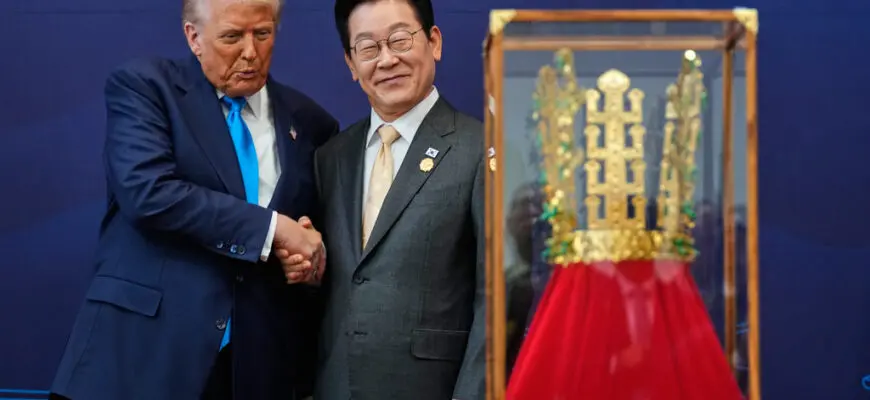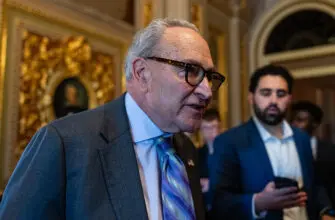During his state visit to South Korea, President Donald Trump received lavish gifts, including a gilded replica of an ancient Korean crown and the nation’s highest honor, even as local protests against his policies chanted “No kings: Trump not welcome.”
As part of his six-day tour of Asia, Donald Trump arrived in South Korea where President Lee Jae-myung looked to appeal to the U.S. President with lavish gifts—a diplomatic tactic also employed by others, such as Japan’s Prime Minister who presented Trump with golf clubs. Lee, however, presented the man who had previously proclaimed himself “king” on a fake TIME magazine cover with a gold crown.
The gift was a specially gilded replica of an ancient Korean kingdom crown, presented during a ceremony at Gyeongju National Museum in Gyeongju. The original crown, considered a national treasure, is more than 1,000 years old and was excavated in the 1970s.
A South Korean official explained to Trump that the crown “symbolizes the divine connection between the authority of the heavens and sovereignty on earth, as well as the strong leadership and authority of a leader.” The official added that the gift commemorated Trump’s state visit and recognized a “golden age of the Korea-U.S. alliance.”
Lee also conferred the Grand Order of Mugunghwa, South Korea’s highest honor, upon Trump, making him the first U.S. President to receive it. Trump thanked Lee for the gifts, remarking while looking at the medal, “It’s really beautiful. I’d like to wear it right now.”
While the government appealed to Trump’s fondness for gold and monarchical self-regard, some South Koreans protested nearby with chants including “No kings: Trump not welcome.”
This rallying cry echoes “No Kings” protests across the U.S. and highlights growing anger among South Korean civic groups, opposition politicians, and citizens over Trump’s aggressive diplomatic approach, which includes high tariffs, harsh immigration policies, and demands for foreign investment. These are all issues Lee seeks to negotiate in high-stakes trade talks.
“It seems the U.S. is seeing and treating South Korea as its cash cow,” Kim Sol-yi, a 22-year-old college student who joined a protest in Seoul on Saturday, told the BBC. “Honestly, it makes me pretty mad and question whether the U.S. even thinks of us as an equal partner.”

Despite only a third of South Koreans having confidence in Trump as a world leader (according to a June Pew report), a majority of South Koreans see the U.S.’s rivalry with China as their country’s greatest threat, according to a poll by the newspaper JoongAng Ilbo and the East Asia Institute. Furthermore, Pew data indicates that 89% of South Koreans view the U.S. as their most vital ally. Anti-China protests have also gripped the country as it prepares to host a summit between Trump and Chinese President Xi Jinping.
This situation necessitates a delicate balancing act for President Lee, who is attempting to normalize ties with both rival superpowers.
“U.S. is the indispensable security ally; China is the indispensable economic partner,” says Lam Peng Er, principal research fellow at the National University of Singapore’s East Asian Institute. “They don’t want to be caught in a binary situation where you have to cast a lot with just one side, because they really need good relationship both sides.”









